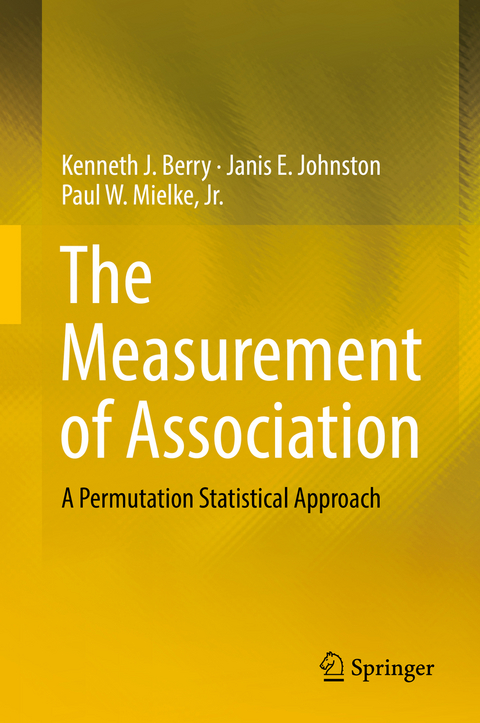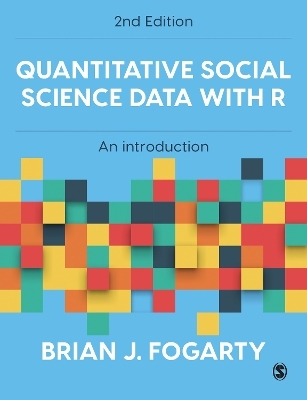
The Measurement of Association
Springer International Publishing (Verlag)
978-3-319-98925-9 (ISBN)
This research monograph utilizes exact and Monte Carlo permutation statistical methods to generate probability values and measures of effect size for a variety of measures of association. Association is broadly defined to include measures of correlation for two interval-level variables, measures of association for two nominal-level variables or two ordinal-level variables, and measures of agreement for two nominal-level or two ordinal-level variables. Additionally, measures of association for mixtures of the three levels of measurement are considered: nominal-ordinal, nominal-interval, and ordinal-interval measures. Numerous comparisons of permutation and classical statistical methods are presented.
Unlike classical statistical methods, permutation statistical methods do not rely on theoretical distributions, avoid the usual assumptions of normality and homogeneity of variance, and depend only on the data at hand. This book takes a unique approach to explaining statistics by integrating a large variety of statistical methods, and establishing the rigor of a topic that to many may seem to be a nascent field. This topic is relatively new in that it took modern computing power to make permutation methods available to those working in mainstream research.
Written for a statistically informed audience, it is particularly useful for teachers of statistics, practicing statisticians, applied statisticians, and quantitative graduate students in fields such as psychology, medical research, epidemiology, public health, and biology. It can also serve as a textbook in graduate courses in subjects like statistics, psychology, and biology.
Paul W. Mielke, Jr. is Emeritus Professor at Colorado State University and a fellow of the American Statistical Association. He received a B.A. in mathematics from the University of Minnesota before training in meteorology at the University of Chicago for the U.S. Air Force. He earned an M.A. in mathematics from the University of Arizona and a Ph.D. in biostatistics from the University of Minnesota. In 1963 he joined the Department of Mathematics and Statistics at Colorado State University, retiring in 2002. His research interests are in permutation methods, meteorology, and environmental issues. Kenneth J. Berry is Professor of Sociology at Colorado State University. He received a B.A. in sociology from Kalamazoo College and a Ph.D. in sociology from the University of Oregon. He was employed by the University of Buffalo for four years before joining the Department of Sociology at Colorado State University in 1970, where he remains. His research interests are in non-parametric tests and measures, permutation methods, and statistical inference.
1 Introduction.- 2 Permutation Statistical Methods.- 3 Nominal Level Variables, I.- 4 Nominal Level Variables, II.- 5 Ordinal Level Variables, I.- 6 Ordinal Level Variables, II.- 7 Interval-level Variables.- 8 Mixed-level Variables.- 9 Fourfold Contingency Tables, I.- 10 Fourfold Contingency Tables, II.- Epilogue.- References.- Index.
| Erscheinungsdatum | 17.11.2018 |
|---|---|
| Zusatzinfo | XX, 647 p. 22 illus. |
| Verlagsort | Cham |
| Sprache | englisch |
| Maße | 155 x 235 mm |
| Gewicht | 1160 g |
| Themenwelt | Mathematik / Informatik ► Mathematik ► Computerprogramme / Computeralgebra |
| Mathematik / Informatik ► Mathematik ► Wahrscheinlichkeit / Kombinatorik | |
| Schlagworte | 62gxx, 62-07, 62-03, 62axx • association • combinatorics • contingency tables • Correlation • effect size • exact probability • exact tests • Minkowski distance function • Moment Approximation • Monte Carlo tests • Permutation • Permutation Tests • resampling • Resampling Approximation |
| ISBN-10 | 3-319-98925-1 / 3319989251 |
| ISBN-13 | 978-3-319-98925-9 / 9783319989259 |
| Zustand | Neuware |
| Haben Sie eine Frage zum Produkt? |
aus dem Bereich


